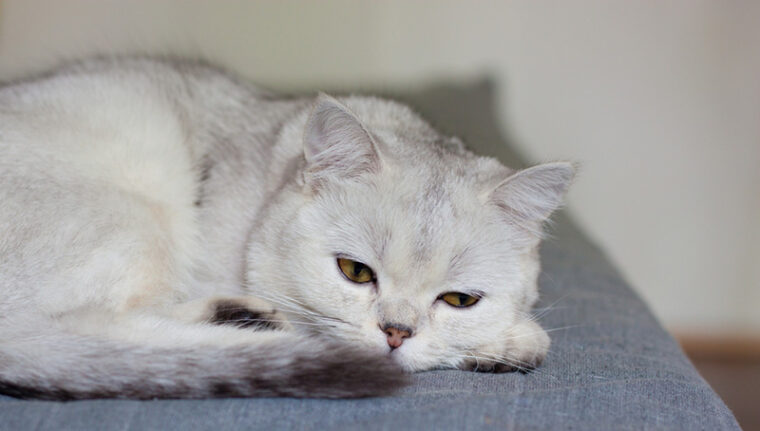
Cats may be extremely independent, self-sufficient animals, but many simply don’t drink enough water. There are multiple reasons that your cat may not drink enough water, but one of the reasons is that cats are descendants of desert-dwelling cats that mainly obtained their hydration from their prey. The need for water has increased in domestic cats over time due to the fact that their diets are not always moisture rich, but the drive to drink more hasn’t changed much.
While a temporary mild dehydration isn’t much of a concern, major dehydration or prolonged dehydration are both extremely concerning. There are lots of tips and tricks out there to help you increase the amount of fluids your cat gets every day, but if you think your cat might not be drinking enough, it’s important for you to familiarize yourself with the signs of dehydration. You also need to be aware of how to tell the difference between mild and severe dehydration so that you know when to get your cat help.
The 7 Signs of Dehydration in Cats
1. Lethargy
Have you ever forgotten to drink water throughout the day, only to find yourself feeling extra low on energy by the end of the day? Mild dehydration can lead to lethargy, which can be mild to severe. A mildly dehydrated cat is likely to only feel a little bit low on energy, while a severely dehydrated cat is likely to have very little energy to get up and do anything, even drink water.
Lethargy in cats may be hard to spot, though. Cats tend to spend a lot of time sleeping throughout the day, and many cats are most active at night when everyone else is asleep. Try to familiarize yourself with your cat’s sleep and play habits so you know when they are seemingly extra tired.
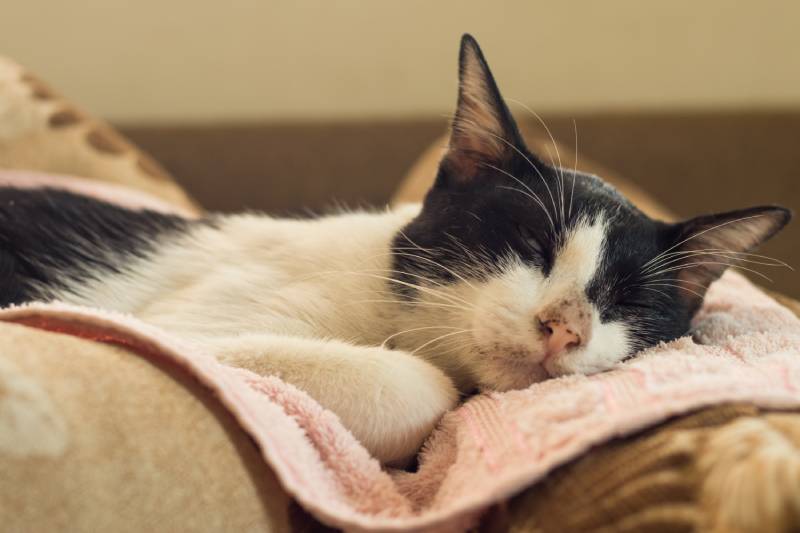
2. Weakness
Lethargy and weakness aren’t the same thing, but the signs of both can be quite similar. With both problems, your cat will likely spend less time up and moving around and more time sleeping. With weakness, though, your cat is likely to seem weak when they are up and moving around.
They may have trouble jumping up onto furniture, catching a toy, or holding themselves up to eat or drink. If your cat seems even mildly weak, this should be a concern to you, and it’s a good idea to get them checked over by a vet. There are many conditions that can cause weakness, including illnesses and injuries.
3. Decreased Appetite
Cats that are feeling dehydrated are likely to eat less than normal. This may seem counterintuitive since food can often be a source of hydration, but think about how your appetite is if you haven’t been drinking enough water. If your mouth is dry or you’re feeling lethargic and weak, then you likely won’t feel good enough to even want to eat. The same goes for your cat.
You may be able to stimulate your cat to eat with extra-smelly food. If you’re able to, aim for high-moisture foods, like fresh food or wet cat food, as these can support rehydration efforts. If your cat’s decrease in appetite is significant or if they stop eating entirely, then it’s extremely important that you take them to the vet as soon as possible.
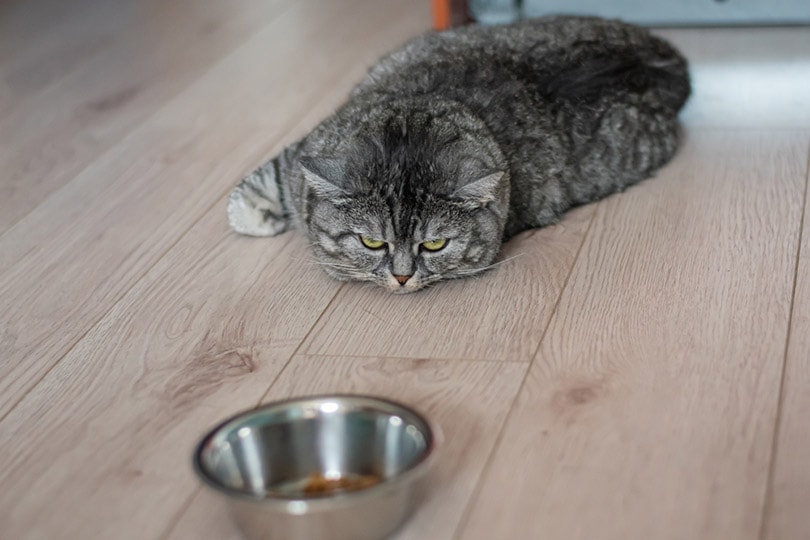
4. Panting
Panting in cats is uncommon, and it very commonly points to a concerning medical issue when it does occur. Dehydration caused by a medical condition may not lead to panting, so this sign isn’t a surefire way to determine your cat’s hydration status.
If your cat has overheated or been exposed to high temperatures, though, they may pant to cool themselves off. Not only will your cat lose moisture because of the high temperature itself, but they can also lose a significant amount of moisture through panting and sweating. Panting in cats should always be checked by a vet.
5. Tacky Gums
When dehydration occurs, the mucus membranes can become quite sticky due to the lack of moisture. There are multiple mucus membranes throughout your cat’s body, but the most noticeable is their gums. If your cat is dehydrated, their gums will likely be tacky to the touch. In some cases, this may be accompanied by pale gums. If your cat’s gums only feel slightly tacky, then they are likely mildly dehydrated, while dry, sticky gums are likely to indicate a more serious level of dehydration.
Tacky gums in cats are typically considered to be a sign that your cat should be evaluated by a vet.
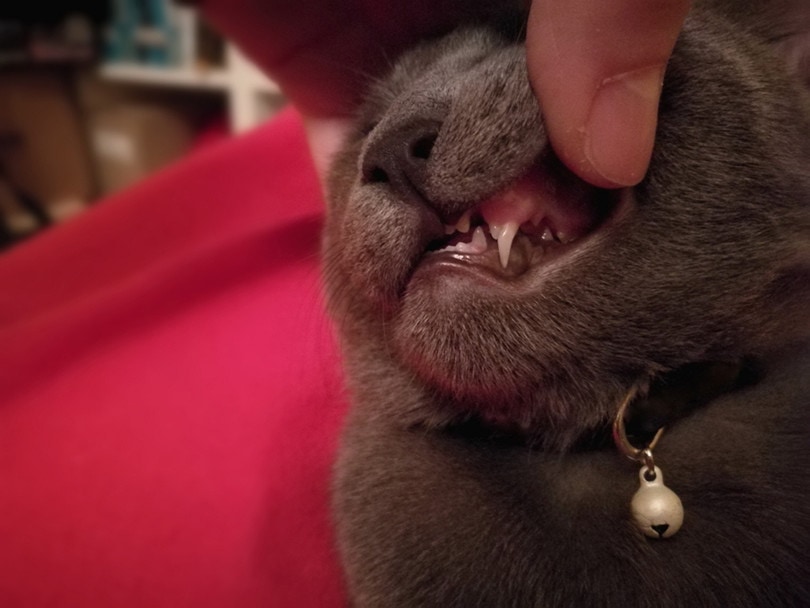
6. Decreased Skin Turgor
Checking for decreased skin turgor is a quick and easy way to get a general idea of your cat’s hydration status. The process to check skin turgor consists of pulling up a loose area of your cat’s skin, typically between the shoulder blades.
In a hydrated cat, the skin will quickly fall back into place when you let go of it. In a dehydrated cat, the skin will very slowly move back into its original position, staying in a “tented” position. The more dehydrated a cat is, the slower the skin will drop back to its proper position.
Much like with the gums, tenting indicates that the body is lacking moisture, leaving the structures of the skin dry and “sticky.” On the outside, your cat’s skin won’t necessarily feel any differently, but the reaction of the skin to being lifted will be abnormal.
Keep in mind that older cats may have decreased skin turgor due to age-related changes, so this sign doesn’t always indicate concerning dehydration.
7. Sunken Eyes
In severe cases of dehydration, your cat’s eyes may begin to appear sunken. If this occurs, then your cat needs immediate medical attention. Sunken eyes only occur in extremely severe cases of dehydration, and they can also indicate a whole host of medical problems.
As dehydration occurs, moisture is pulled from the skin and muscles, causing a loss of the natural plumpness of these structures. When it comes to the face, the skin around the eyes is naturally quite thin, so significant loss of moisture can quickly cause the eyes to appear sunken as the tissues lose their plumpness.
Sunken eyes are an uncommon sign of dehydration because this typically only occurs in very severe dehydration cases. Cats with sunken eyes should be evaluated by a vet as soon as possible, and this condition should be treated as an emergency.

FAQ
Why Is My Cat Dehydrated?
There are multiple reasons that cats become dehydrated, and not drinking enough water is only one of them. Medical conditions like kidney disease, hyperthyroidism, and diabetes can lead to fluid imbalances in the body, causing dehydration. Heat stroke, heat exhaustion, and other external factors that lead to excess fluid loss can also cause dehydration. Vomiting and diarrhea are some of the most common causes of dehydration in cats.
How Can I Get My Cat to Drink More Water?
There are a few tricks you can try to get more water into your cat every day. One is feeding your cat moisture-rich fresh or wet cat food. Wet food is sometimes even recommended in place of kibble, though some vets will recommend that your cat receives both.
Just remember that if you start giving your cat wet cat food, then you need to decrease the amount of other food they’re receiving. If your cat is at a healthy weight, then it’s important to avoid accidentally overfeeding them and causing weight gain.
Providing a cat fountain, a dripping faucet, or other moving water options can increase the appeal of water for your cat, leading to a marked increase in consumption. You should also consider moving your cat’s water bowl to a place where your cat feels safe and secure, as well as a place that is away from their litter box. Also, providing your cat with a water bowl that is wide and shallow will allow them to drink water without whisker fatigue or discomfort.
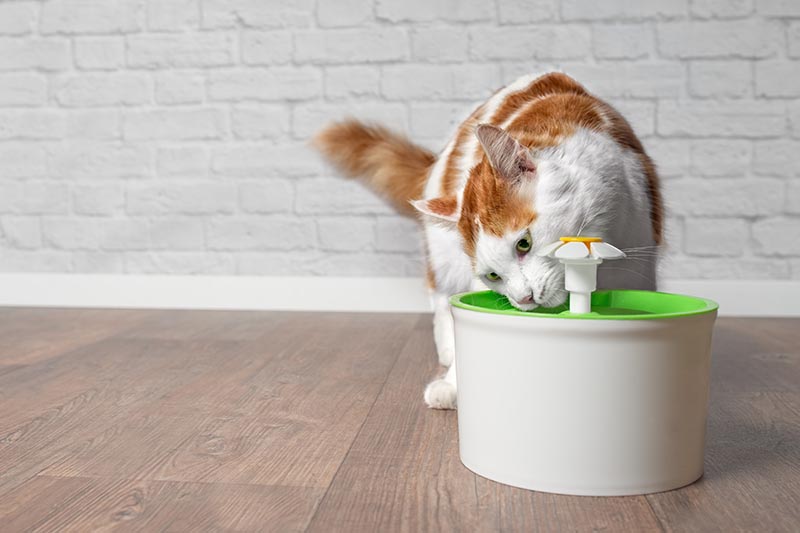
Can I Take Care of My Cat’s Dehydration at Home?
The simple answer to this question is that it really depends on the cause and severity of your cat’s dehydration. If your cat chronically simply doesn’t drink enough water, then you can try some of the previously mentioned tips and tricks to increase your cat’s water consumption.
If your cat seems notably, suddenly, or severely dehydrated, then you should not attempt to reverse the dehydration at home. Significant skin tenting and sunken eyes should be an automatic vet visit. In cases of severe dehydration or dehydration caused by an underlying medical issue, your cat may need hospitalization.
Is Dehydration Easy to Fix?
Once again, the answer is that it depends entirely on the situation. Mildly dehydrated cats can often have their dehydration reversed by simply getting them to drink more water or eat more moisture-rich foods. Severe dehydration, on the other hand, indicates that there is a very significant problem with your cat’s health. While severe dehydration can usually be reversed with vet care, prolonged severe dehydration can lead to organ damage and even lead to death.
Conclusion
Identifying the cause of your cat’s dehydration will likely be more difficult for you than determining that your cat is dehydrated. There are multiple signs you can watch for to better monitor your cat’s hydration status. For cats that seem chronically dehydrated, a vet visit is a good idea to rule out underlying problems. For acutely moderate to severely dehydrated cats, a visit to the vet is absolutely necessary.
Featured Image Credit: stokerolga, Shutterstock







